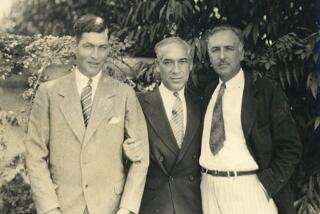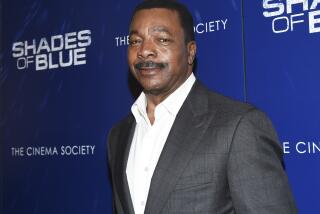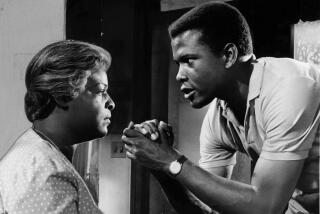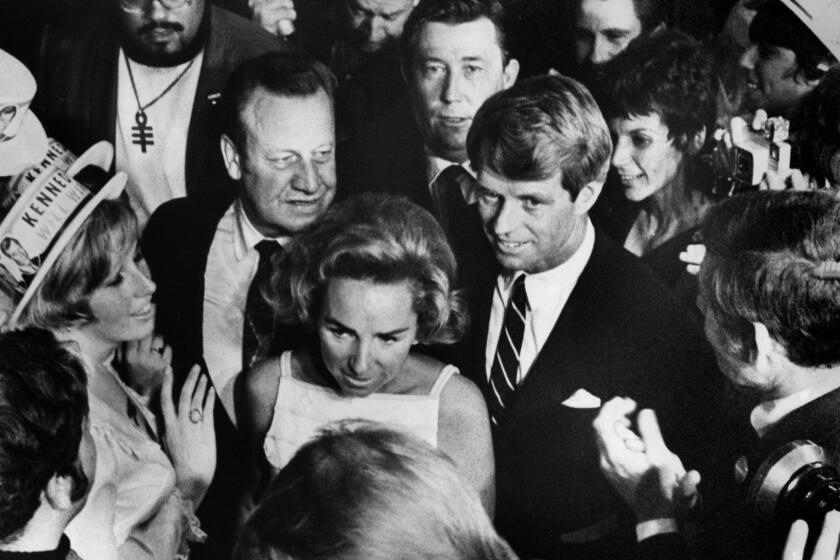From the Archives: Wally Beery, Veteran Film Actor, Dies
Wallace Beery, the “lovable old rascal” of many a Hollywood film, is dead. He died Friday night at his home, 816 N. Alpine Drive, Beverly Hills.
The veteran actor succumbed to a heart condition. He had suffered from the ailment for several months and had been confined to his home for the past two weeks.
“Mr. Beery seemed fairly well Friday.” said the nurse who attended him. “He was up and dressed and seemed in an optimistic and pleasant frame of mind.
Collapses Without Pain
“He ate a fairly large dinner and afterward was reading the papers and magazines. Then at 10 p.m. he collapsed.
“It happened so last. There was no pain, no suffering.”
The nurse summoned Dr. Myron Prinzmetal, the actor’s physician, and members of the family. He was dead before help arrived.
Those who gathered at his bedside included his adopted daughter, Carol Ann; his divorced wife, Mrs. Arleta Beery; his brother and sister-in-law, the Will Beerys; his nephew, Noah Beery Jr. and several friends.
Services Set Tuesday
Funeral services will be conducted at 10:30 am. Tuesday in the Church of the Recessional, Forest Lawn Memorial-Park, by the Rev. Ross Shafer. Interment will follow.
Mr. Beery known to millions of motion picture fans as the hard-boiled, clumsy but kindly character he loved to play, was a veteran of more than three decades in films.
Said L.B. Mayer, head of MGM, where the actor was under contract for almost 20 years: “With the passing of Wallace Beery, the screen loses one of its most lovable figures, who brought pleasure to millions for many years.”
He played a variety of roles. He started by enacting a Swedish maid in a slapstick comedy. One of his most powerful roles was that of the industrialist in “Grand Hotel.”
Born in Kansas City
But he was best known to the American public as a rough-hewn character with a sentimental streak, a lumbering hulk of man who would run his hand over his massive face and mutter. “Aw, shucks!”
Mr. Beery was born in Kansas City. Mo., on April Fool’s Day. The year varied in various recountings. The family yesterday set the date as 1885 and the actor’s age as 64.
But Mr. Beery himself gave his birth year as 1886, and through the years motion-picture press agents have listed it as 1888 or 1889.
His father, Noah, was a city policeman and his mother, Margaret, had her hands full with three boys, William, young Noah and Wallace.
William completed high school and went to work with a circus as a concession manager. Noah’s education ended at the seventh grade, and he went to New York to find a job as a chorus boy. Wallace stopped his studies in the fifth grade.
Elephant Handler
Books put aside, the gawky adolescent started to work wiping railroad engines. Then his brother William got him a job tending elephants in a circus. The salary was $3.50 a week and an extra $1.50 if he remained all season. He stayed many years.
In his teens he became one of the best elephant handlers in the business. Alone he trained the pachyderms to stay in line, trunk to tail. His reputation got him a big job with Ringling Bros.
Finally New York lured him. Brother Noah was doing well, earning $25 a week as a singer. So Wallace decided to give up elephants for the footlights, and Noah got him a job in the chorus of “Babes in Toyland.” He spent his winters in New York, his summers in stock.
Mr. Beery was in his early 20s when he received his first bid from motion pictures. He was asked to report for work with the Tannhauser studios at New Rochelle, N.Y. It rained the day he was to start to work and so he gave up pictures temporarily.
The next year, however, he signed with Essanay studios in Chicago and played his first film role.
In 1915 Mr. Beery moved to Niles, Cal., to direct motion pictures. The outfit he worked for closed down after three months. Then he was hired by Keystone at $125 a week.
Beery ‘in’ Again
Shortly afterward, he organized a troupe to make films in Japan. World War 1 disrupted those plans, and Mr. Beery returned to acting. He was cast most frequently as a heavy, playing roles in such pictures as “The Unpardonable Sin,” “Behind the Door” and “The Four Horsemen of the Apocalypse.”
It was Douglas Fairbanks who started him in the humorous, tough parts that he loved so well. Fairbanks saw the qualities in the homely actor which later distinguished him and, accordingly, cast him in lighter roles. There was a contract from Paramount.
Sound pictures temporarily shelved Mr. Beery. His name was placed on the “not adaptable” list. Then Irving Thalberg chose him for the role of “Butch” in “The Big House.”
Beery was “in.”
In 1930 he was teamed with Marie Dressler in “Min and Bill,” and the two constituted one of the greatest screen teams in film history. The following year he made “Hell Divers” with Clark Gable.
In the two decades that followed, he made more than 50 major pictures, including: “The Champ,” (which won him a special Academy Award), “Dinner at Eight,” “Tugboat Annie,” “The Bowery,” “Viva Villa!” “China Seas,” “O’Shaughnessy’s Boy,” “Stablemates,” “The Mighty Barnum,” “A Message to Garcia” and “Thunder Afloat.”
The actor once said that he estimated he had made more than $50,000,000 (net) for MGM. He also accumulated a sizable fortune for himself.
Attitude on Acting
In later years he limited his screen work to one or two films a year. His last picture was “Big Jack,” described by the studio as “the story of a lovable, pre-Civil War bandit.”
Mr. Beery relied on his face, not his acting, for his fortune.
“Acting?” he said once, “I gave up the acting business years ago. Now I just put on dirty clothes and am myself.”
He liked to tell a friend who once urged him to have his face lifted, warning him that time would make his face “look like an old squash.”
“I consulted a plastic surgeon who asked $500 for the operation,” the actor would relate. “I had only $100. See, suppose I’d had the $500. Where would I be now? A once-pretty has-been!”
Fitted for Rough Roles
Mr. Beery attributed his long popularity to his appeal to men and youngsters. He was well fitted for his rough roles. Towering above six feet, he had a bulky figure and a booming voice.
The boisterous screen roles, however, were in sharp contrast to the real Beery. He was soft spoken, unexcitable and entirely lacking in temperament at home. He would even disregard his aversion to “dude duds” to don evening clothes whenever his adopted daughter wished him to escort her for an evening.
Mr. Beery knew boy’s problems from his own experience. He gave assistance to many youths off on the wrong foot; obtaining jobs for them and helping mold them into worth-while citizens. He never liked to discuss that activity, dismissing questions about it in embarrassment.
Flying was Hobby
Hunting and flying were his hobbies. Years ago he obtained a transport pilot’s license, and even when plane travel was unusual, he was flying his own craft on his hunting junkets.
It was at his ranch at Jackson Hole, Wyo., that he suffered the heart strain that led to his death. He was cranking an outboard motor when he was first stricken.
The actor held a reserve commission as a lieutenant commander in the Navy and was a lieutenant colonel in the Wyoming State Militia. He will be buried in his Navy uniform.
Beery was married twice. His first wife was actress Gloria Swanson, whom he met while both were working for Essanay in Chicago. They were divorced in 1918. His second wife was the former Arleta Gillman. In 1932, they adopted Carol Ann, daughter of Mrs. Beery’s cousin. The second marriage ended in divorce in 1939.
From the Archives: Debonair Actor Joseph Cotten Dies at 88
From the Archives: Film Star William Powell Dies at 91
From the Archives: Bette Davis Dies in Paris at 81
From the Archives: Nat ‘King’ Cole dies of cancer at 45
From the Archives: Gloria Swanson, Queen of Movies’ Golden Years, Dies
More to Read
Start your day right
Sign up for Essential California for the L.A. Times biggest news, features and recommendations in your inbox six days a week.
You may occasionally receive promotional content from the Los Angeles Times.







